 Maddox Hall | |
| Type | Private |
|---|---|
| Established | 1985 |
| Dean | Dr. Jeffrey Mercer |
| Location | , , US |
| Website | cphs |
The Campbell University College of Pharmacy & Health Sciences is the pharmacy school of Campbell University in Buies Creek, North Carolina.
 Maddox Hall | |
| Type | Private |
|---|---|
| Established | 1985 |
| Dean | Dr. Jeffrey Mercer |
| Location | , , US |
| Website | cphs |
The Campbell University College of Pharmacy & Health Sciences is the pharmacy school of Campbell University in Buies Creek, North Carolina.
Founded in 1985, the College is one of seven schools that compose Campbell University. In 2009, the school's name was changed to Campbell University College of Pharmacy and Health Sciences. [1]
The Campbell University College of Pharmacy & Health Sciences launched a physician assistant program in August 2011, a public health program in August 2012, a physical therapy program in January 2014, and an undergraduate nursing program in August 2014.
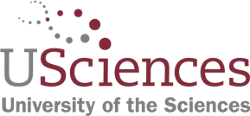
University of the Sciences in Philadelphia, previously Philadelphia College of Pharmacy and Science (PCPS), was a private university in Philadelphia, Pennsylvania. On June 1, 2022, it officially merged into Saint Joseph's University.

East Tennessee State University (ETSU) is a public research university in Johnson City, Tennessee. It was historically part of the State University and Community College System of Tennessee under the Tennessee Board of Regents, but since 2016, the university has been transitioning to governance by its own board of trustees. As of May 2017, it is the fourth largest university in the state and has off-campus centers in nearby Kingsport, Elizabethton, and Sevierville.
Keck Graduate Institute (KGI) is a private graduate school in Claremont, California. Founded by Henry Riggs and David Galas in 1997, it is the seventh and newest member of the Claremont Colleges.
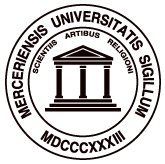
Mercer University is a private research university with its main campus in Macon, Georgia. Founded in 1833 as Mercer Institute and gaining university status in 1837, it is the oldest private university in the state and enrolls more than 9,000 students in 12 colleges and schools. Mercer is a member of the Georgia Research Alliance. It is classified as a "R2: Doctoral Universities — High research activity".

Northeast Ohio Medical University (NEOMED) is a public medical school in Rootstown, Ohio, United States. It specializes in graduate education in medicine and pharmacy but also has a College of Graduate Studies.
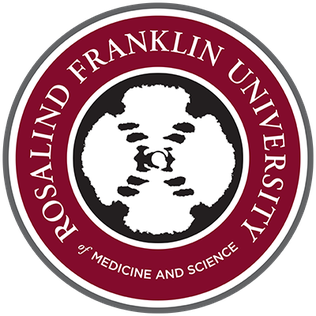
Rosalind Franklin University of Medicine and Science (RFU) is a private graduate school in North Chicago, Illinois. It has more than 2,000 students in six schools: Chicago Medical School, College of Health Professions, College of Nursing, College of Pharmacy, Dr. William M. Scholl College of Podiatric Medicine, and School of Graduate and Postdoctoral Studies. The university is named for famous DNA crystallographer Rosalind Franklin. Photo 51, an X-ray diffraction pattern of the B form of DNA, captured by Franklin in 1952, was pivotal in 20th-century history of biology. The image is depicted in the university's seal and logo.
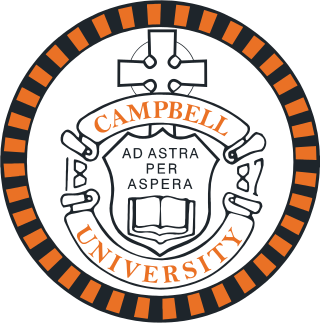
Campbell University is a private Christian university in Buies Creek, North Carolina, United States. Campbell's main campus in Buies Creek is home to its College of Arts & Sciences, College of Pharmacy & Health Sciences, Divinity School, School of Education, Lundy-Fetterman School of Business, and the School of Engineering. Nearby is the Health Sciences Campus, home to the Jerry M. Wallace School of Osteopathic Medicine and the Catherine W. Wood School of Nursing. Campbell also operates a Raleigh Campus in downtown Raleigh, which is home to the Norman Adrian Wiggins School of Law as well as other programs. It maintains additional satellite campuses in Fort Liberty/Pope Air Force Base and at Camp Lejeune in North Carolina, and provides online classes through adult and online education. The university athletics teams are the Fighting Camels; its athletics programs field 20 NCAA Division I teams.

Western University of Health Sciences (WesternU) is a private medical university in Pomona, California. With an enrollment of 3,724 students (2022–23), WesternU offers more than twenty academic programs in multiple colleges. It also operates an additional campus in Lebanon, Oregon.

Southwestern Oklahoma State University (SWOSU) is a public university in Weatherford and Sayre, Oklahoma. It is one of six Regional University System of Oklahoma members.
University of Cincinnati Health is the healthcare system of the University of Cincinnati, Cincinnati, Ohio. It trains health care professionals and provides research and patient care. The system was formally affiliated via the University of Cincinnati Academic Health Center (AHC).

The University of Florida College of Medicine is the medical school of the University of Florida. It is part of the J. Hillis Miller Health Science Center, with facilities in Gainesville and Jacksonville, Florida. The school grants Doctor of Medicine (M.D.), Doctor of Medicine-Doctor of Philosophy (M.D.-Ph.D.), and Physician Assistant (P.A.) degrees to its graduates. Its primary teaching hospital is UF Health Shands Hospital with which the school shares a campus in Gainesville.
Northeastern University School of Pharmacy and Pharmaceutical Sciences is the pharmacy school at Northeastern University in Boston, Massachusetts. It is one of four schools that comprise the Bouvé College of Health Sciences. Northeastern's Doctor of Pharmacy (PharmD) program is the only PharmD cooperative education, or co-op, program in the United States. Students who participate in the co-op program are placed in paid, full-time positions that provide profession experience.
The University of Pittsburgh School of Pharmacy is the graduate pharmacy school of the University of Pittsburgh in Pittsburgh, Pennsylvania, United States. Founded in 1878, it offers Doctor of Pharmacy (PharmD) and Doctor of Philosophy (PhD) degrees, as well as a residency training program. The school is one of the university's six schools of the health sciences and is ranked in the top 10 of pharmacy schools according to U.S. News & World Report.
The Eugene Applebaum College of Pharmacy and Health Sciences was founded in 1924. Previously known as the College of Pharmacy and Allied Health Professions, the name changed to the Eugene Applebaum College of Pharmacy and Health Sciences in the year 2000. It is currently located in Midtown Detroit, Michigan and is one of Wayne State University's professional schools. There are currently 12 programs being offered at the school. The college is divided into four academic departments: Applied Health Sciences, Health Care Sciences, Pharmacy Practice, and Pharmaceutical Sciences.

The University of Colorado Anschutz Medical Campus is the academic health sciences campus in Aurora, Colorado that houses the University of Colorado's six health sciences-related schools and colleges, including the University of Colorado School of Medicine, the CU Skaggs School of Pharmacy and Pharmaceutical Sciences, the CU College of Nursing, the University of Colorado School of Dental Medicine, and the Colorado School of Public Health, as well as the graduate school for various fields in the biological and biomedical sciences. The campus also includes the 184-acre (0.74 km2) Fitzsimons Innovation Community, UCHealth University of Colorado Hospital, Children's Hospital Colorado, the Rocky Mountain Regional Veterans Affairs hospital, and a residential/retail town center known as 21 Fitzsimons. CU Anschutz is the largest academic health center in the Rocky Mountain region.
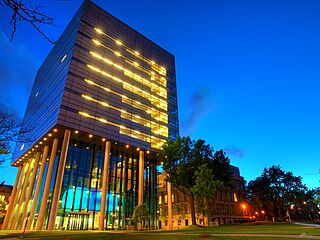
The Leslie Dan Faculty of Pharmacy is a pharmacy school and an academic division of the University of Toronto. The school is located on the northwestern corner of College Street and University Avenue, placing it across from the Ontario Legislative Building and at the entrance to Queen's Park station. It is also situated near four internationally renowned hospitals—The Hospital for Sick Children, Princess Margaret Cancer Centre, Toronto General Hospital and Mount Sinai Hospital. It is part of Toronto's Discovery District.
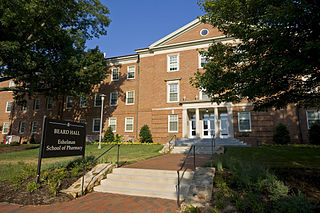
The UNC Eshelman School of Pharmacy is located at the University of North Carolina at Chapel Hill, and includes a satellite campus at UNC Asheville. The Asheville School of Pharmacy campus opened in 2011, and graduated its first class in 2015.
Roseman University of Health Sciences is a private university focused on healthcare with its main campus in Henderson, Nevada. It has additional campuses in South Jordan, Utah and Summerlin, Nevada. It enrolled its first class in January 2001 and was originally called the Nevada College of Pharmacy and the University of Southern Nevada.

The Bouvé College of Health Sciences is the allied health education college of Northeastern University in Boston, Massachusetts. It encompasses four schools: School of Community Health and Behavioral Sciences, School of Nursing, School of Clinical and Rehabilitation Sciences, and School of Pharmacy and Pharmaceutical Sciences. The college offers more than 80 undergraduate and graduate programs, including its online-based accelerated nursing program. In addition to Boston, Bouvé College of Health Science programs are offered at satellite locations in Burlington, Massachusetts and Charlotte, North Carolina and online.